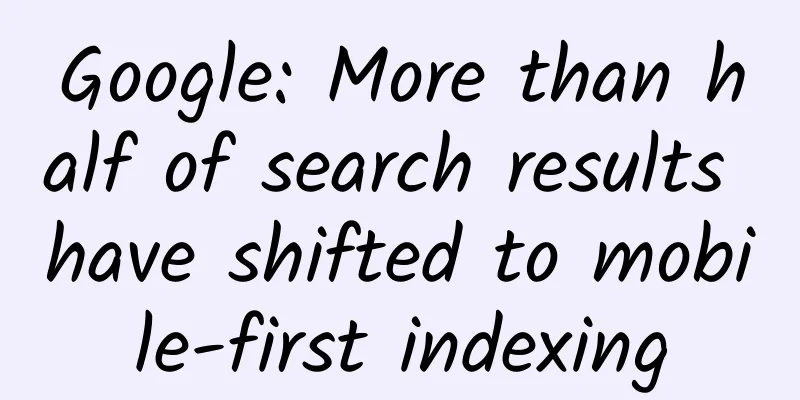Google: More than half of search results have shifted to mobile-first indexing

|
According to US technology media TechCrunch, Google announced today that more than half of all search results use mobile-first indexing, which means that Google search results are more biased towards mobile websites rather than PC websites. Google has been working for many years to achieve this result. In 2016, Google first advocated mobile-first indexing and explained its impact on search indexing. At that time, Google said that in the future, when indexing pages, it would tilt towards mobile website content, understand its structured data, and display mobile website snippets in Google search results. Today, most people access Google Search through mobile devices, but Google's search ranking was built for the PC era. Because of this, the system looks at the PC web content to determine how relevant it is to the user. If the PC and mobile are out of sync, problems will arise. Before responsive web design became popular, many website owners would build special versions of their websites that were simpler than the desktop version, kept separate, and sometimes had less information, specifically for mobile visitors. Through Google searches, users were directed to the mobile version of the website. Once there, users could not find the content they were looking for because it only existed on the desktop version of the website. In December 2017, Google began to shift a small number of websites to mobile-first indexing. After a year and a half of testing, Google officially promoted mobile-first indexing at the beginning of this year. When moving to mobile-first indexing, if the website does not introduce responsive web design, there may be two major problems. First, some websites use structured data on the desktop version, but not on the mobile version. Only by using structured data can Google understand the content of the website and highlight the content of the web page in the search results. Second, on some mobile websites, images do not have text tags (Alt-text), which makes it difficult for Google to understand the content of the images. |
Recommend
With the help of "direct imaging", exoplanets can be "believed"
Produced by: Science Popularization China Author:...
NRDC & Peking University: Research on the potential for coal-fired power transformation and optimization in typical provinces in China
Based on the characteristics of geographical loca...
Overview of advertising in March, inventory of top advertisers for App and brand promotion!
According to the mobile advertising intelligence ...
When a doctor writes an order for an IV, is he doing it for your own good or to cheat you out of your money?
Your child has a high fever. Give him an IV so he...
[2014 WOT Shenzhen Station Lecturer Interview] Huo Dianyan: New technology is the core value of mobile games
From November 21 to 22, 2014, the 2014 WOT Global...
Mosquito bites are so itchy! What does the brain want to tell you through the itching signal?
Leviathan Press: When you are bitten by a mosquit...
After applying it, the skin becomes transparent, and the blood vessels and muscles are clearly visible...
Produced by: Science Popularization China Author:...
Let’s talk about SwiftUI layout protocol
Introduction One of the best new features added t...
Eating these 7 foods to supplement iron is not reliable!
What can you eat to "replenish iron and bloo...
Gaia-0 Basic Beginner Short Video Monetization Training Camp
Gaia-0 Basics Novice Short Video Monetization Tra...
"10 Efficient Law Learning Methods of Tsinghua and Peking University Students" teaches you how to improve your learning efficiency
Training course content: The course starts from t...
The latest transfer technology on September 9, transfer intact, no editing, full Douyin operation, no Douyin block
The latest transfer technology on September 9, tr...
140 million people are playing! Is there a winning secret to the popular game of throwing eggs?
During the Spring Festival, in addition to eating...
In order to control salinization, they actually raise shrimps on the Loess Plateau?
Salinization refers to the process of accumulatio...









